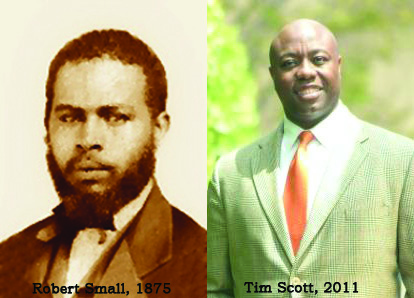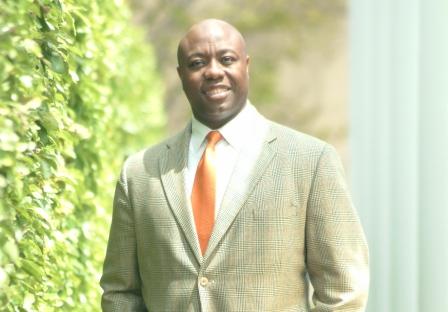The United States’ government is constantly evolving, and Wednesday, January 5, 2011 proved a day of no exception as Tim Scott became the first black Congressman from the Deep South since Reconstruction after the Civil War. This is a significant event as 125 years have passed since the previous black Congressman, Robert Smalls, represented South Carolina for the Republican Party. Regardless of the racial issues prevalent in this long-awaited election, Congressman Scott is focusing on the future rather than the past, but the difference between times is well worth noting.
Born into slavery in 1839, Robert Smalls not only led his family out of slavery by commandeering a Confederate transport steamer in 1862 for the Union, but beat tough odds whilst serving in the South Carolina House of Representatives from 1868-70, the State Senate in 1870 then Congress from 1875 to 1886(www.robertsmalls.org). Although gratuitously reimbursed by Abraham Lincoln for his heroic endeavors during the Civil War thus enabling him to purchase the house which he was enslaved, he wasn’t free from chaos altogether. These were times riddled with hate-mongering, white Democrats focused on reclaiming the governor’s seat in the South Carolina State House by force, and the summer and fall of 1868 fell like hail on the state’s Republicans.
The first black representatives to serve South Carolina’s legislature were delegates to the state constitutional convention in the April of 1868 sparking the most assassinations in the state’s history. Although delegates Joseph H. Rainey, Robert C. De Large, Robert B. Elliot, Richard Harvey Cain, Alonzo J. Ransier and Robert Smalls remained alive during this period, four of their Republican constituents weren’t so fortunate. In “State of Rebellion: Reconstruction in South Carolina”, Richard Zuczek gives an account of events following the constitutional convention when writing, “A few weeks later James Martin, a legislator from Abbeville, was killed in front of the Abbeville Court House. In early October, Johnson Stuart…Republican from Newberry, was shot to death riding home from a political meeting. Weeks later his friend Lee Nance, president of the local Union League, was found murdered in his front yard,” and at, “about the same time, B.F. Randolph, a black carpetbagger and member of the General Assembly, was assassinated as he stepped off the train at Hodges Depot.” These occurrences didn’t stop Robert Smalls from continuing with his political career, but they wouldn’t encourage many blacks to begin one as a Republican.

The Deep American South may still have Confederate Flags and Republican run states, but they are no longer run by racists whom are hell bent on the demise of blacks. When FOX NEWS asked Congressman Scott if he would join the Congressional Black Caucus he replied, “…My theory is what we should do is focus on creating one foot print for America. When we have these sectors; divided we fall.” This advice originating from one of Aesop’s fables should not fall upon deaf ears, and it is calming to know that America is advancing on this front.
Readers May Also Like:

Class Warfare: Republicans vs Republicans

The Ethnic Community Support Tax Cut Extension

Protesting is back! Protesting for social change in America

NLE Choppa Leads Peaceful Protest in Honor of Tyre Nichols

